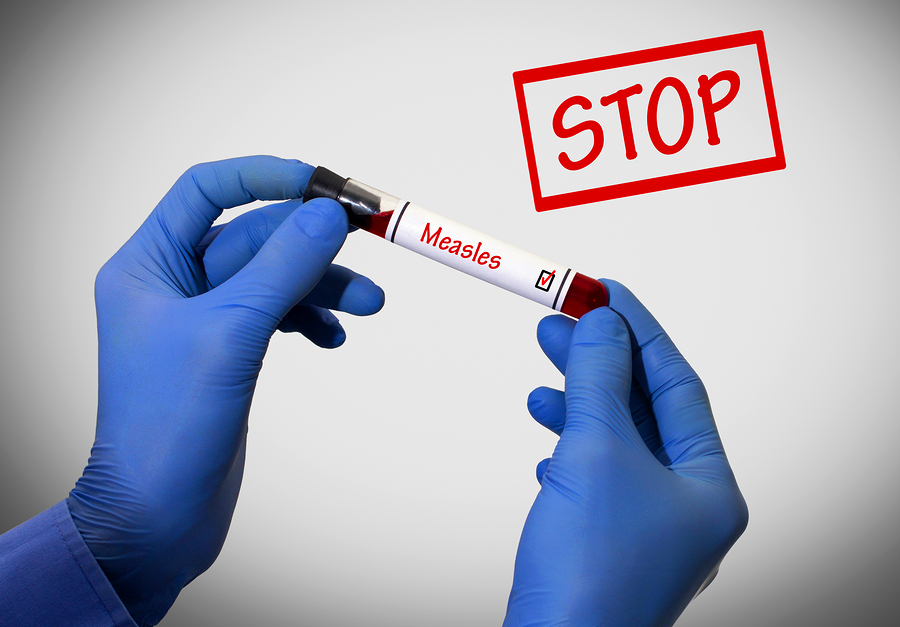Measles
What is measles?
Measles is a viral infection that begins with a fever that lasts for several days, followed by a cough, runny nose, and conjunctivitis (pink eye). The rash starts on the face and upper neck, spreads down the back and trunk, and then extends to the extremities (arms and legs) to include the hands and feet. After about 5 days the rash then fades in the same order it appeared.
That all sounds fairly benign, so why should we worry about the measles?
Here’s why!
- 1: 4 = require hospitalization
- 1: 1000 = Get encephalitis(inflammation of the brain)
- 1 or 2: 1000 = Will die from this illness either from pneumonia or encephalitis
- Pregnant Unvaccinated Women or Women who’s antibodies to the vaccine are no longer protective= are at risk if they acquire measles during pregnancy for Miscarriage, Still birth, Prematurity, or Congenital Rubella Syndrome which consists of heart problems, Microcephaly(small head), hearing and vision problems, learning problems, and the list goes on.
How is measles spread?
- A person with measles is contagious for 4 days before developing symptoms and remains contagious until 4 days after symptoms evolve.
- The measles virus lives in the mucous of the nose and throat, and is spread when people sneeze or cough.
- Droplets from coughing enter the air and can contaminate a space for up to 2 hours after person leaves
- Incubation period(time from exposure to dev of disease) is 7-21 days.
Memphis had 3 distinct outbreaks and now 7 confirmed cases. The cases were not related to foreign travel and the health department could find no relationship between the outbreaks but are still investigating.
So what about the measles vaccine!
- Introduced in 1963, and is combined with Mumps and Rubella to give the MMR (Measles, Mumps, and Rubella) vaccine. In 2000, Measles was felt to be eliminated in the United States, but there are still pockets of disease secondary to people traveling outside of the US and bringing it home or in populations which opt out of vaccines.
- There is no scientific proof that the measles vaccine causes Autism, and the vaccine does not contain mercury. The fear of both of these things has caused families to not vaccinate.
- Nationally, 91.9% of children between 19-35 months of age have had at least one MMR vaccine as of 2013. However, Arkansas’s numbers were at 88.3% for the country (near the bottom but not the worst). The saddest part of these statistics, is that our state is at the very bottom of the list for this age group having received all of its vaccines at 57% (means only 57% of kids in Arkansas between 19-35 months of age are completely immunized).
- At present the recommendations are that children receive 2 doses of the MMR vaccine. The first dose to be given between 12-15 months of age, and this would protect 93% of those exposed from getting measles. The second dose normally is given between 4-6 years of age,with entrance to school and raises the protection level to 97%(this means if you were exposed to measles you should be protected against not getting it 97% of the time). If the health department deems necessary, they will change timing of second vaccine and request it to be given 28 days after first.
- Those less then 5 yrs of age are the one of the most susceptible groups, either because they are too young to vaccinate or have not gotten their second dose of the vaccine.
What about babies who aren’t vaccinated because they are too young?
Babies get passive immunity from their mothers (antibodies pass through the placenta), but no one is quite sure how long these last for. Thus this age group is very much at risk.
What other groups can’t receive the vaccine?
Pregnant women, those on steroids and other immunosuppressive medicines can not receive the MMR vaccine. This includes those individuals who have undergone transplants or are bring treated for cancer.
So the major take home point is that we need to get our children immunized with the MMR vaccine to protect them, but also to protect those in the community who are too young, pregnant, or unable to be vaccinated for other medical reasons. Stay informed by checking your local news and visiting our website for updates.
Liquid Medication Safety
[av_video src=’http://www.youtube.com/embed/mXt9XWEGSzw’ format=’16-9′ width=’16’ height=’9′]
[av_textblock size=” font_color=” color=”]
The American Academy of Pediatrics gives the following tips for liquid medication safety.
- Always read the label to make sure the medicine is safe for infants and toddlers.
- Check the dosage chart to assure you are giving the correct amount based on child’s weight.
- Do not mix measuring devices from other products.
- Keep all medication up and away from children’s reach.
- Talk to your pediatrician if you have any questions.
Also remember… ALWAYS use a correct measuring device to give medicine to children. Utensil spoons do not accurately measure medication.
[/av_textblock]
Flu Mist & Flu Shot Available
[av_image src=’https://jbrkids.com/wp-content/uploads/2016/05/flu.jpg’ attachment=’1922′ attachment_size=’full’ align=’center’ styling=” hover=” link=” target=” caption=” font_size=” appearance=” overlay_opacity=’0.4′ overlay_color=’#000000′ overlay_text_color=’#ffffff’ animation=’no-animation’][/av_image]
[av_textblock size=” font_color=” color=”]
The Children’s Clinic just received a shipment of the Flu Mist* flu vaccine. We also have flu shots in stock. It is not too late to protect yourself against the flu! Call our office today to schedule your flu vaccine appointment.
Influenza is dangerous for children
Influenza (“the flu”) is more dangerous than the common cold for children. Each year, many children get sick with seasonal influenza; some of those illnesses result in death.
- Children commonly need medical care because of influenza, especially before they turn 5 years old.
- Severe influenza complications are most common in children younger than 2 years old.
- Children with chronic health problems like asthma, diabetes and disorders of the brain or nervous system are at especially high risk of developing serious flu complications.
- Each year an average of 20,000 children under the age of 5 are hospitalized because of influenza complications.
- Flu seasons vary in severity, however some children die from flu each year. Last influenza season, more than 140 flu-related pediatric deaths were reported.
For flu-related updates from the Centers for Disease Control & Prevention, follow @CDCFlu on twitter.
* Flu Mist nasal spray flu vaccine is not recommended for children under the age of 2 years old. Your child’s physician will determine if this is the best method of vaccinating your child.
[/av_textblock]
Gardasil HPV Vaccine Safety Assessed
From Forbes
The largest review of the available evidence on the quadrivalent, or four-strain, HPV vaccine Gardasil, has found no evidence of any serious short-term or long-term safety issues. Bringing together the findings from clinical trials, post-licensure studies and data presented at scientific meetings but not yet published, the researchers focused particularly on autoimmune diseases, nervous system disorders, anaphylaxis, blood clots and stroke – but none of them is caused by the vaccine, they found.
Physical Fitness for Kids
Studies show that the lifestyle learned as children are much more likely to stay with a person into adulthood. For this reason, physical activity should be a regular part of family life.
Parents play a key role in helping their children become more physically active. Exercise along with a balanced diet provides the foundation for a healthy lifestyle. The most important things parents can do is encourage healthy habits in their children early in life.
What you can do…
- Take a walk or bike ride as a family.
- Play music and dance while doing chores
- Spend the afternoon at the playground
- Go for a hike
- Set family fitness goals
- Encourage children to sign up for a sport activity
- Set positive examples
- Give your children toys and equipment that encourages physical activity (jump rope, balls, etc)
- Turn off the TV. The American Academy of Pediatrics recommends no more than 1 to 2 hours of screen time per day.
- Don’t overdo it.
- Choose age appropriate activities
- Plan ahead and provide a safe environment
Does the Flu Vaccine Work and should my child get one this Flu season?
Does the Flu Vaccine Work and should my child get one this Flu season?
The answer to both these questions is yes.
Recent news reports have come out in reference to the CDC’s reported concern about the Flu Vaccines effectiveness. And thus the question must be should I even bother getting my child a Flu vaccine if it’s ability to help is in question?
Setting aside the very small minority who are not eligible to receive the Flu vaccine like those who are allergic, and who have immune related issues and those under 6mo of age, every eligible person should get a Flu vaccine. Despite reports of the Flu vaccine not be as effective as hoped any vaccine is better than none. Our immune system responds to vaccines by producing antibodies to fight off actual infections we come in contact with. The vaccines job is to trick our immune system into thinking we have the illness, in this case the Flu, and thus stimulating an immune response that leads to the production of these protective Flu antibodies. Most will develop these protective antibodies in 2-4wks after receiving the vaccine.
The problem with the Flu is unpredictability. The Flu type, severity, and the timing of its arrival to the U.S. from other parts of the world are extremely unpredictable. The top 3-4 types of the Flu are used to create the vaccine. If the these most common forms of the Flu are not the type(s) of Flu that show up during this Flu season then the vaccine will appear to be less effective as many who received the vaccine may still come down with Flu-like symptoms. However, the Flu vaccine, even in these cases, still provides protection. But that doesn’t make any sense, right? But realize that despite being vaccinated and still contracting the Flu the likelihood is that without some protective antibodies, produced secondary to the vaccine, the person would have been more critically ill and may have even required hospitalization. So despite concerns over the effectiveness of the Flu vaccine we at the Childrens Clinic would agree with the CDC’s recommendation and urge all our eligible patients to receive a yearly Flu vaccine, along with their family members to help prevent illness from spreading and to avoid the need to hospitalize our patients.
Enterovirus D68 and Children
By. Dr. Warren Skaug
As if parents didn’t have enough to worry about, here comes a new potentially serious infection to threaten our children. Enterovirus D68 has been in the news almost daily for the past several weeks, it seems to be spreading throughout the country, including Arkansas, so it might be helpful to have a little information about this virus from your doctor’s perspective.
First, you need to know that enteroviruses are a big family of viruses that commonly pass child-to-child in the Summer and Fall of the year. Most members of this family of germs cause acute illnesses that make kids miserable but resolve on their own over several days. They cause various symptoms from fever to runny nose to sore throat to diarrhea, and sometimes skin rashes (including Hand-Foot-Mouth disease). There is no real cure or vaccine for these illnesses; they go away on their own. Among these many virus strains, the D68 variety was rarely seen in the past, but for some reason that strain has become a very big problem this year.
Enterovirus D68 appears to cause just cold symptoms initially and is impossible to distinguish early on from any number of not-so-bad respiratory viruses. However, in many children, especially those who have asthma, the illness progresses to respiratory distress lasting several days, often requiring hospitalization to manage. In recent days, there have been frightening reports of arm and leg muscle weakness during the recovery phase in some of these patients, and it is not yet clear whether all children will recover from that complication.
From your doctor’s perspective, this is a nightmare. Every day, we see a great many children with cold symptoms caused by the usual harmless viruses around us. We can’t pick out the very few who will potentially develop severe breathing distress over the following few days. Also, the specific test for Enterovirus D68 (yes, there is one) is not readily available to physicians around the country. Nasal swab samples have to be sent to the Arkansas Department of Health and then to the CDC in Atlanta, GA to be analyzed, and they are only accepted from hospitalized patients. Another thorny issue is that there is no specific treatment – just the supportive care we might give to any patient with respiratory distress – oxygen if they need it, breathing treatments, and close watching.
From a parent’s perspective, here’s what you can do: Enteroviruses are spread through secretions (snot, saliva, stool). Just employing good hand washing and cleanliness at home can reduce their spread. Good day care centers typically know this and employ those practices. If your child gets sick with runny nose and cough, he/she should be treated for a routine cold because that’s probably what it is. But also closely watch for onset of wheezing or breathing distress over the following few days and get to your health care provider if those occur. You may depend on us to consider the possibility of Enterovirus D68 as we evaluate your child.
Thankfully, so far, illness from this virus appears uncommon in Arkansas, but we are on guard for a possible increase over the next several weeks. We are waiting, just as you, are for more information about its spread, for better diagonstic and treatment options, and hopefully, for its prevalence to eventually decrease as the Winter season gets here.
2013 Flu Clinic for The Children’s Clinic
The Children’s Clinic is currently scheduling appointments for their flu clinics. You can call our office at 870-935-6012.
We are not providers for the VFC program, which means our ARKIDS or Arkansas Medicaid patients will need to contact their local health unit.
Back to School – The Wellness Checkup
It is that time again that every parent’s wallet fears… back to school. The school supplies have been purchased. Your kids will be dressed and the newest, trendiest cloths and shoes. The backpack that voices your child’s personality has been chosen. But did you remember to add immunizations, vision & hearing tests, and physicals? Many schools will not enroll children without an immunization record and proof of a recent wellness checkup that includes hearing and vision tests.
Immunizations
To view recommended vaccinations from the CDC and read what each vaccine is, visit our immunizations page on our website.. If you need a copy of your child’s immunizations records, you can contact your local health department or we would gladly provide this for you.
Vision & Hearing
Kids who cannot see or hear well cannot perform as well in school. It is estimated that one out of every 20 children cannot see fully out of at least one of their eyes. Some of the more serious eye diseases like amblyopia (lazy eye) or strabismus (crossed eyes) are correctable with eye patches or surgery if caught early. Once a child is seven or eight years old, the opportunity to correct the problem may have been lost, resulting in permanent vision problems.
Children with hearing loss who begin early intervention earlier have significantly better developmental outcomes than similar children who begin intervention later. Those children are able to progress at age-appropriate rates. Left undetected, mild or unilateral hearing loss can result in delayed speech and language acquisition, social-emotional or behavioral problems, and lags in academic achievement.
Wellness Visit
During your wellness visit at The Children’s Clinic, we will monitor your child’s physical growth, developmental activities, hearing & vision, review immunization records, and review safety and nutritional milestones.
Also, getting a physical examination for your young athlete is very important to address sports-specific issues, including injuries, nutrition, training and exercise programs, and even attitudes, peer pressure and feelings.
If your child needs a wellness visit before school starts, call us at 870-935-6012 to schedule their visit today.









